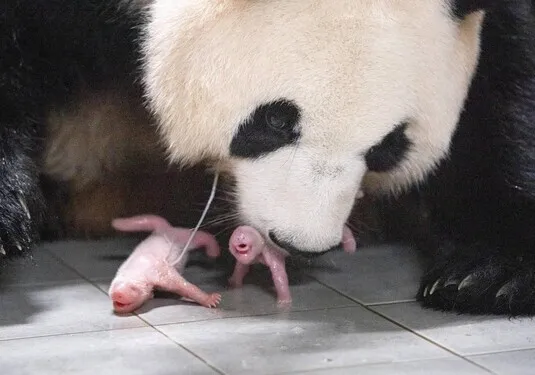hankyoreh
Links to other country sites 다른 나라 사이트 링크
China gains 2 new ambassadors to Korea in form of newborn panda cubs

The Everland theme park’s announcement Monday that its pandas Le Bao, 10, and Ai Bao, 9, had given birth to two female cubs on July 7 has attracted major interest in China, where the Ministry of Foreign Affairs responded with a message of congratulations.
After being asked to comment by a reporter with a Chinese news agency during a regular briefing on Monday afternoon, ministry spokesperson Wang Wenbin said, “The giant panda is a national treasure and name brand for China and an envoy for friendly exchanges between China and the rest of the world.”
“Ai Bao’s first baby, Fu Bao, is much adored by the ROK public,” he added.
He went on to express China’s hope that the new babies “will play a part in thickening the bond and friendship between Chinese and the people of the ROK just like their sister Fu Bao has.”
The same morning, the Chinese Embassy in Seoul posted a message entitled “Fu Bao: You’re a big sister now” to its official WeChat account. In it, the embassy shared details about the newborn pandas’ health and the pregnancy process.
Chinese media published numerous articles reporting on the embassy’s response and the ministry’s briefing. The state-run China Central Television (CCTV) presented a detailed report on the twin pandas’ birth and the cooperation between South Korea and China around the time of the birth. Internet users expressed thanks to the South Korean keepers for their efforts.
The reason Chinese diplomatic offices have been so active in their response to the Everland pandas’ birth is because of their long history of using the animals for diplomatic purposes.
Pandas are a rare type of animal found only in China. In 1941, Chiang Kai-shek of the Kuomintang gave the first panda donation to the US as a token of gratitude for its support to the Republic of China.
China’s “panda diplomacy,” really got its start during the Cold War in 1972, when it gifted a visiting US President Richard Nixon two of the black-and-white bears. When the enactment of the Washington Convention (also known as the Convention on International Trade in Endangered Species of Wild Fauna and Flora, or CITES) in 1983 banned the sale or donation of rare animals, a new method emerged: long-term loans. China went on to loan pandas across Europe and Japan, even to Korea and Thailand.
While China’s panda diplomacy was effective at promoting friendly bilateral relations, it’s also been a source of tensions.
In February of this year, a giant panda named Le Le who had been in the care of the Memphis Zoo in the US died. Reports that another panda at the zoo was also facing health problems prompted anti-American sentiment in China, with many calling for China to take back the remaining bear.
Costs associated with caring for pandas have been a point of issue as well. Borrowing a panda comes with a US$1 million price tag per year, and sourcing enough bamboo for the creatures can be difficult.
In 2021, Edinburgh Zoo in Scotland announced that it planned to return to China a pair of pandas, Yang Guang and Tian Tian, that it had looked after for 11 years. A drop in zoogoers during the COVID-19 pandemic coupled with substantial costs of care for the creatures were cited as the reason.
By Choi Hyun-june, Beijing correspondent
Please direct questions or comments to [english@hani.co.kr]

Editorial・opinion
![[Correspondent’s column] Coupang’s game in Washington follows familiar pattern [Correspondent’s column] Coupang’s game in Washington follows familiar pattern](https://flexible.img.hani.co.kr/flexible/normal/500/300/imgdb/original/2025/1226/8217667391873536.jpg) [Correspondent’s column] Coupang’s game in Washington follows familiar pattern
[Correspondent’s column] Coupang’s game in Washington follows familiar pattern![[Editorial] Coupang’s attempt to hide behind US won’t win back Korean consumers [Editorial] Coupang’s attempt to hide behind US won’t win back Korean consumers](https://flexible.img.hani.co.kr/flexible/normal/500/300/imgdb/original/2025/1226/1817667387971465.jpg) [Editorial] Coupang’s attempt to hide behind US won’t win back Korean consumers
[Editorial] Coupang’s attempt to hide behind US won’t win back Korean consumers- Coupang under fire for possible obstruction of investigation into its customer data leak
- [Editorial] Coupang founder’s contempt for workers, customer security knows no bounds
- [Column] Confessions of a Coupang-holic
- [Editorial] Kim Bom-suk’s arrogance on full display in boycott of Coupang leak hearing
- [Editorial] The facts of Yoon’s insurrection are clear — justice cannot be further delayed
- [Column] Trump destroys government
- [Column] A post-Western world approaches
- [Column] Offshore balancing, or carving out spheres of influence?
Most viewed articles
- 1Korea to trial next-gen train capable of sub-2-hour Seoul-Busan trip starting 2030
- 2Kim Jong-un’s hidden motive in criticizing South Korea’s nuclear submarine push
- 3[Editorial] Coupang’s attempt to hide behind US won’t win back Korean consumers
- 4Coupang under fire for possible obstruction of investigation into its customer data leak
- 5[Correspondent’s column] Coupang’s game in Washington follows familiar pattern
- 6Real-life heroes of “A Taxi Driver” pass away without having reunited
- 7Moon Jae-in renews call for end-of-war declaration, peace treaty on Korean Peninsula
- 8Chang Chun-ha’s family hopes to know truth of his death after 37 years
- 9Chinese money flooding into South Korean companies
- 10Russian architect personally witnessed Empress Myeongseong’s assassination by Japanese ronin, accoun